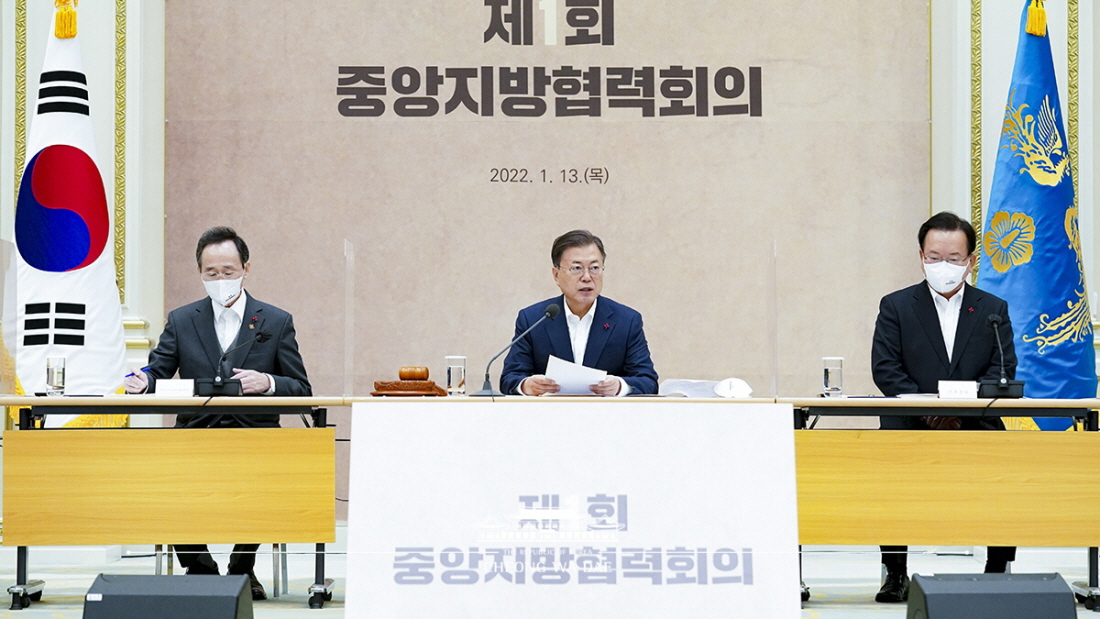이 웹사이트는 제19대 대통령 임기 종료에 따라 대통령기록관이 「대통령기록물 관리에 관한 법률」에 의해 이관받아 서비스하는 대통령기록물입니다. 자료의 열람만 가능하며 수정 · 추가 · 삭제는 불가능합니다.
다만, 「개인정보보호법」에 의하여 개인의 정보를 보호받기 원하시는 분은 관련 내용(요청자, 요청내용, 연락처, 글위치)을 대통령 웹기록물 담당자(044-211-2253)에게 요청해 주시면 신속히 검토하여 조치해 드리겠습니다. 감사합니다.
SPEECHES & REMARKS
BRIEFINGS
Remarks by President Moon Jae-in at 1st Central and Local Government Cooperation Meeting

Let me begin the first Central and Local Government Cooperation Meeting.
The era of autonomy and decentralization 2.0 has begun. The overhauled Local Autonomy Act as well as five laws to strengthen autonomy and decentralization will come into force all at once from today.
Thanks to many people who worked hard to promote autonomy and decentralization, we have been able to reach this milestone. I am grateful to everyone who has strived for grassroots democracy as well as the devolution of power and autonomy to localities.
Today, with this new beginning of local autonomy, we have convened the first Central and Local Government Cooperation Meeting. Even though there have already been mayoral and gubernatorial meetings, it is very historic that the Central and Local Government Cooperation Meeting is being officially launched. Legally defined and binding, the Meeting is in effect a second Cabinet Meeting.
The Central and Local Government Cooperation Meeting is a new way to conduct state affairs. Local and central governments will closely consult with each other and make decisions about major locality-related administrative issues. The quarterly meetings will become the chief decision-making apparatus to deal with regional agenda items.
Through seven meetings that have brought together mayors and provincial governors, we have confirmed the role and viability of the Central and Local Government Cooperation Meeting. A roadmap for autonomy and decentralization, which was discussed at one such meeting in 2017, laid the cornerstone for the autonomy and decentralization that will change people’s lives.
In 2018 at a meeting with mayors and provincial governors chosen during the seventh popular election, the central and local governments announced the “Republic of Korea Job Declaration.” Now, we will use the outcome of the meetings held so far as a stepping stone to attend to regional development and stabilizing people’s livelihoods in a more meticulous manner.
Over the past four and a half years, the Government has steadily expanded the autonomy of local governments. A total of 400 administrative tasks were transferred collectively to local governments, and a special system tailored to cities, counties and districts was introduced to give their grassroots governing bodies the necessary powers.
With an autonomous local police system having been adopted, local area-specific public security administration is in operation.
Fiscal decentralization has also been strengthened. The rate of the VAT-based consumption tax distributed to local areas was raised 10 percentage points, enabling localities to secure an additional 8.5 trillion won in taxes. Starting this year, the second stage of fiscal decentralization will be implemented as planned to expand local finances by a total of 13.8 trillion won.
The path for residents’ direct participation has also widened. The number of local areas operating a residents’ self-governing committee on a pilot basis has significantly increased, and a resident ordinance proposal system will also be implemented in earnest from this year. Local councils have also enhanced their expertise and authority, for instance, by creating a new position: policy support officer.
At the first Central and Local Government Cooperation Meeting today, we will review the achievements of local autonomy and decentralization to date as well as discuss ways to revitalize local economies and plans for pan-regional cooperation.
Last year, we established ourselves as a bona fide advanced country and pulled off an impressive achievement – all-time high exports. Due to the prolonged COVID-19 pandemic, however, people are still struggling to make ends meet, and we have not been able to solve the issue of concentration in the Seoul metropolitan area. The challenges of the times – like our low birthrate and aging population, the Fourth Industrial Revolution and climate change – can be effectively dealt with only when the central and local governments join forces.
Most of all, we should concentrate our capabilities on revitalizing local areas. Local economies are the backbone of the national economy. I ask you to actively discuss ways to revive local spending, including swiftly providing support for microbusiness owners. Measures to respond to mid- to long-term structural changes should also be devised and examined in advance.
Pan-regional cooperation is the key to a balanced national development policy that will markedly change the lives of residents. Cooperation is beginning in three major metropolitan areas and small-yet-strong regions as well as in Busan, Ulsan and Gyeongsangnam-do Province, where a special-purpose local government will launch soon in February.
We must make pan-regional cooperation a success in order to prove that it is an effective alternative to balanced national development. In this way, we have to ensure that a new model of regional development can spread throughout the country. I would like you to candidly present your opinions on what kind of support the Central Government has to provide and how to improve related systems.
The Government’s authority is strengthened through decentralization. The more residents participate, the firmer our democracy becomes. I hope that Korea will leap closer to becoming a pacesetting nation while banding together through the power of autonomy, decentralization and democracy and jointly surmounting crises.
I ask you to attend the Central and Local Government Cooperation Meeting with the mindset that the Republic of Korea will revive only when local areas do.
Thank you.



